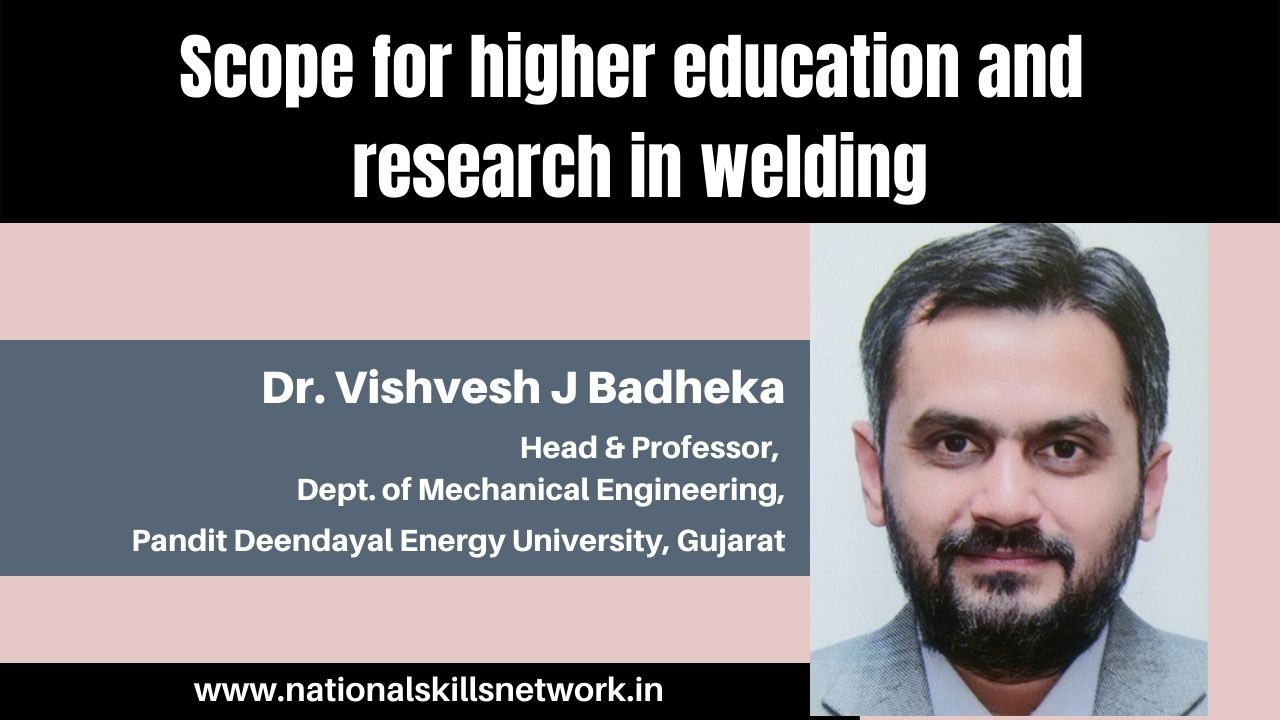Note: This interview is facilitated by Fronius India
“Welding is no longer only joining a couple of metal pieces, it finds importance in the fields of space, atomic industries, defence…”, says Dr. Vishvesh J Badheka, Head and Professor, Department of Mechanical Engineering, School of Technology, Pandit Deendayal Energy University, Gujarat.
Every manufacturing sector has been facing its share of welding challenges either in terms of new materials, advanced technologies, welding processes and many more. All these challenges call for the need for higher education and research in welding, not only in India but across the globe. To understand the current scenario of higher education and research in welding, we interacted with Dr. Vishvesh J Badheka, Head and Professor, Department of Mechanical Engineering, School of Technology, Pandit Deendayal Energy University, Gujarat.
Learn more about the role of industry, professional bodies, and academia in bridging the gap in welding education and training in India.
These are a few excerpts from our conversation, you can watch the full video interview on our YouTube channel below –
Q: How do we overcome the popular perception of welding as a messy/dirty job and bring in the much-need awareness about its potential for higher education and research?
A: Over the past few years, the field of welding has progressed in all aspects. Advanced technologies like Industry 4.0, automation, and robotics have helped welding in achieving sophistication at various levels. Today, one can access and monitor machines and its parameters right from the dashboard on their computers. Welding tools, controls, and welding processes have evolved so much in the past years that it is no more a messy or a dirty job as commonly perceived.
Today, welding is not a niche job anymore. Welding has become a multi-disciplinary field and people from all professions like Product Engineers, Metallurgists, Mechanical Engineers, Computer Science graduates are all needed in welding. Welding no longer means only joining two metals, today it also includes additive manufacturing of metals.
Q: What is the role of research in welding in coming up with industry-specific solutions in technologies like 3D printing/Additive Manufacturing and other domains?
A: Let me give you an example of a car. To manufacture one car body, there at least 3000-5000 joints! This is the magnitude of the importance of welding in manufacturing.
With advanced technologies and applications of these technologies in welding, the welding processes are becoming more sophisticated. Welding is no longer only joining a couple of metal pieces, it finds importance in the fields of space, atomic, defence, by using the applications of metallurgy and additive manufacturing. Therefore, research in welding is crucial to come up with industry-specific solutions to cater to the needs of the industries.

Q: How can we bridge the gaps between the industry and academia with reference to students?
A: In my case, I joined a professional body – the Indian Institute of Welding (IIW) while I was in the 3rd year of my engineering. It helped me understand the domain better. Participating and being part of such a professional body has helped me build my career today.
I would suggest all the students who are about to complete their course/college, to be part of at least one professional body as an intern or apprentice. They should interact with professionals in this domain and it will broaden their perspective and help them build successful careers. The gap between industry and academia can be bridged with the help of a professional body, by making students industry-ready.
At our institute, we invite industry persons to deliver at least 4-5 lectures (or 10% of the syllabus) to the students. They talk about how the topic is linked to the industry, its relevance, and how important it is in the world.
Q: With advancements in technology, how have welding training and education evolved over the years to adopt blended forms of learning?
A: Earlier, we had a conventional way of training a welder. We had to train them on machines and burn a lot of consumables. Now, welding simulators and virtual welding training have become easier and accurate without wasting any consumables. With the help of industry 4.0, assessments have also become very clear.
Through virtual welding, assessment, curriculum, and evaluation can be blended into teaching and welding training methods.
Also read: Engaging youth to strengthen welding education in India – https://nationalskillsnetwork.in/oldsite/engaging-youth-to-strengthen-welding-education-in-india/
Conclusion
Welding must no longer remain as a small part of the Engineering education or skill training in India. Rather it must become an essential part of the course curriculum, along with support from the government and industries in terms of funding and infrastructure. This will enable and push India to create and develop a skilled community of welders/ welding engineers and so on.
If you wish to get in touch with Fronius India, you may reach out to them at– Sales.india@fronius.com or Marketing.india@fronius.com.
Subscribe to our YouTube channel for more updates:
Subscribe on YouTube



